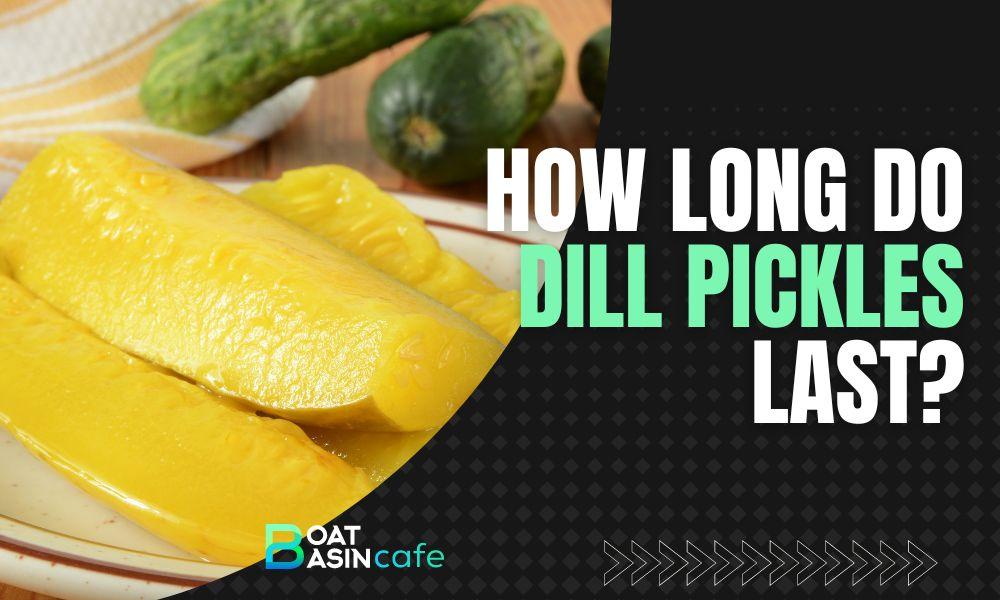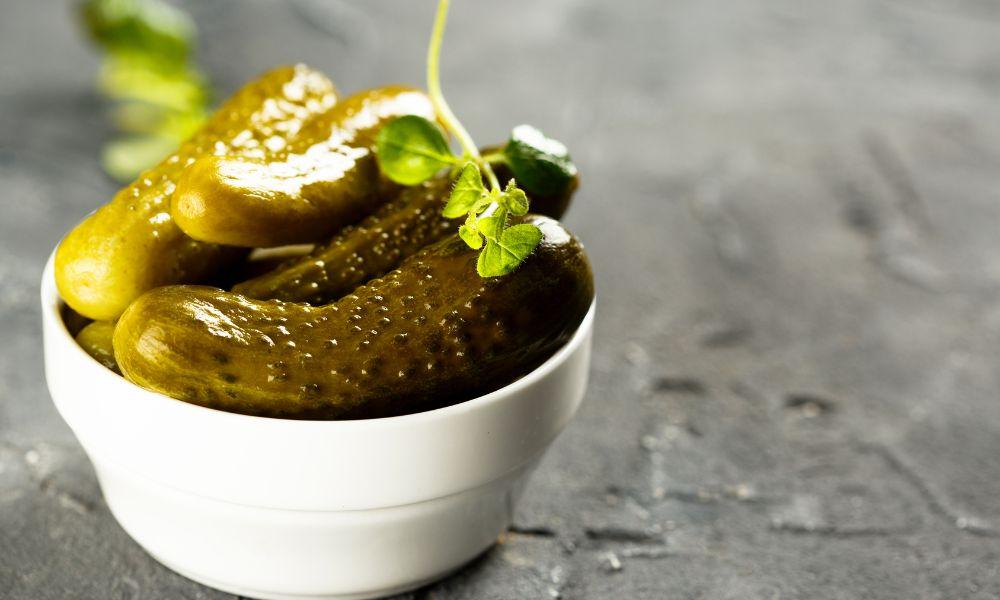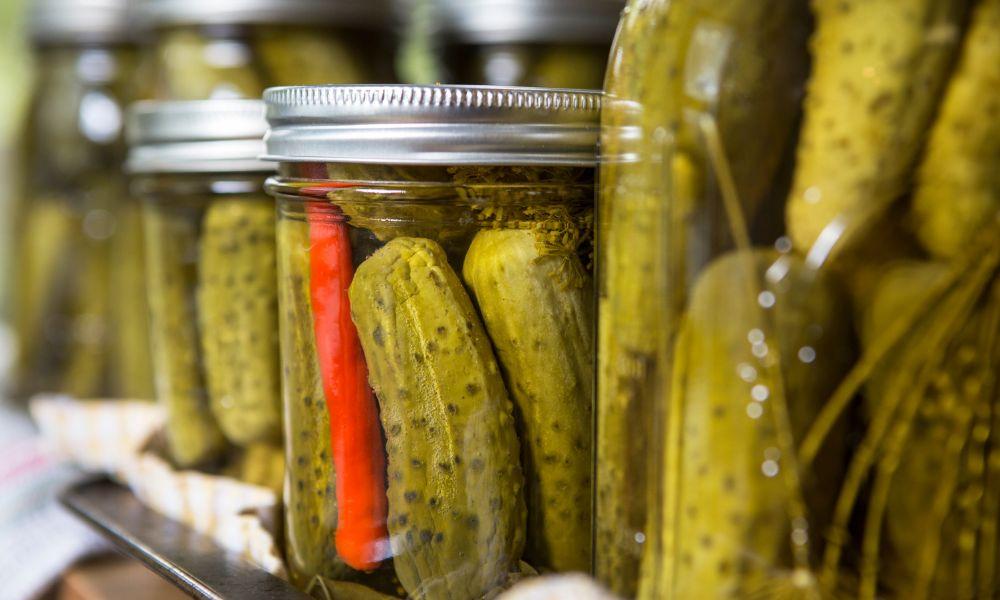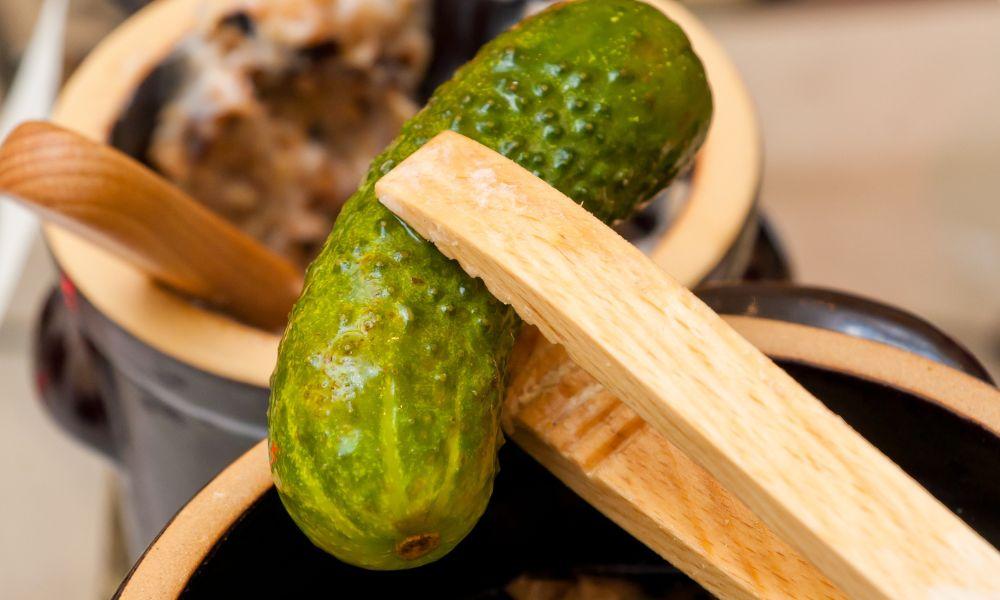Dill pickles have skyrocketed in popularity, thanks to their tangy flavor and versatility. They’re the perfect companion to sandwiches and burgers, and they provide a low-calorie snack option for avid weight-loss seekers. However, many wonder about the pickle shelf life and how to maintain their crisp, delicious taste. In this article, we’ll dive into the factors affecting dill pickle shelf life, proper storage practices, and much more.

Factors Affecting Dill Pickle Shelf Life
Ingredients
Believe it or not, the ingredients used in making dill pickles have a substantial impact on their shelf life. The key ingredients—pickling cucumbers, vinegar, salt, and spices—each contribute in their unique way.
The use of vinegar adds acidity, which prevents harmful microorganisms from growing. This ensures that your dill pickles remain well-preserved during storage. The combination of salt and spices not only adds flavor but also plays a vital role in enhancing the preservation process.
Preservation Methods
Dill pickles undergo a variety of preservation processes to extend their shelf life. The three most common methods are brining, fermentation, and pasteurization.
Brining involves soaking cucumbers in a salty solution that prevents spoilage, while fermentation allows the growth of beneficial bacteria to create a tangy taste and further acidic protection. Lastly, pasteurization—most commonly used in store-bought pickles—uses heat to destroy any remaining unwanted microorganisms, thus extending the pickle’s longevity.
Packaging
Packaging can significantly determine the longevity of dill pickles. Commonly used packaging methods include jars, cans, and vacuum-sealed pouches. Jars are a popular choice since they’re reusable and easy to store. On the other hand, vacuum-sealed pouches keep your dill pickles sealed and protected from air, further extending their shelf life.
Understanding Shelf Life
The shelf life of dill pickles refers to the length of time they maintain their optimal quality, taste, and safety. The shelf life varies depending on factors such as temperature, acidity, and storage methods.
Factors Influencing Shelf Life
The key factors determining dill pickle freshness include:
- 🌡️Temperature: Just like any other perishable food item, the optimal temperature aids in preserving your pickles for a more extended period. A well-regulated temperature keeps them safe from mold growth and other spoilage factors.
- 💧Acidity: The acidic environment of dill pickle brine is critical since it creates an inhospitable environment for harmful bacteria. Maintaining the perfect acidity in your dill pickles will ensure their freshness lasts longer.
- 📦Proper storage: Correctly storing dill pickles is crucial to maximizing their shelf life. For instance, preserving them in sealed containers and away from direct sunlight plays a critical role in prolonging their freshness.
Shelf Life of Homemade Dill Pickles

Average Shelf Life
Typically, the shelf life of homemade dill pickles ranges from 2 weeks to several months or more, depending on various factors. It’s essential to ensure proper storage and handling to achieve the highest shelf life.
Factors Affecting Shelf Life
Several factors affect the shelf life of homemade dill pickles, such as:
- Cleanliness: Making sure your utensils, jars, and work surfaces are sterile reduces the risk of introducing unwanted bacteria that might lead to spoilage.
- Brine strength: The concentration of salt and vinegar in your brine can significantly influence the longevity of your dill pickles. A well-balanced brine provides optimum preservation conditions.
- Storage conditions: Properly sealing your jars and storing them in a cool, dark place will help your homemade dill pickles last even longer.
Shelf Life of Store-Bought Dill Pickles

Average Shelf Life
The shelf life of store-bought dill pickles generally ranges from 1 to 2 years, thanks to preservation methods like pasteurization. However, the actual shelf life may vary depending on the packaging and storage conditions.
Packaging and Label Information
The packaging often contains valuable information, such as “best-by” dates, storage instructions, and packaging indicators. A quick glance at the label will help you determine the ideal storage conditions of store-bought dill pickles. While “best-by” dates are merely a rough estimate of peak quality, they serve as a useful guideline.
In the next half of this article, we’ll explore signs of spoilage, tips for extending dill pickle shelf life, frequently asked questions, and concluding thoughts on the importance of understanding dill pickle shelf life. Be sure to visit Boat Basin Cafe to learn more about pickle juice, and check this article if you’re ever in need of a substitute for dill.
Signs of Spoilage
Visual Changes
Spoiled dill pickles often exhibit visual changes, such as mold, discoloration, or cloudiness. Mold growth is a clear sign that your pickles are no longer safe for consumption. Additionally, any form of discoloration or visible changes in the brine may indicate spoilage.
Odor and Texture Changes
Your dill pickles may have gone bad if you notice changes in smell, texture, and taste. A sour or off smell could mean they’ve spoiled, and the same goes for a mushy or slimy texture. Trust your senses: if something seems off, it’s best not to consume them.
Safety Considerations
It’s crucial to practice proper food handling and disposal if you encounter signs of spoilage. Discard the pickles and ensure you clean the jar or container thoroughly before reusing it. Remember, your safety and well-being come first!
Extending Dill Pickle Shelf Life

Proper Storage
Maximize your dill pickles’ shelf life by following these storage tips:
- Store them in a cool, dark place away from direct sunlight, such as a pantry or cupboard.
- Ensure the container is airtight and properly sealed before storage.
- Regularly check the brine to maintain the required acidity levels.
Refrigeration vs. Pantry Storage
When it comes to storing dill pickles, both refrigeration and pantry storage have their unique benefits and drawbacks. Refrigerating dill pickles can help keep them crisp and fresh for an extended period, but they may lose a bit of their flavor. In contrast, pantry storage allows dill pickles to retain their taste, but they may not last as long, especially in warmer environments.
Tips for Prolonging Freshness
Here are some additional tips to help extend the shelf life of your dill pickles:
- Always keep dill pickles submerged in brine to prevent spoilage.
- Use a clean utensil when removing pickles from the jar, to avoid cross-contamination.
- Keep track of the “best-by” dates and ensure you consume the pickles within the recommended period.
FAQs
How long do dill pickles last in the refrigerator?
Dill pickles can last several months or even longer in the refrigerator, especially if properly sealed and stored in their original brine.
Can I eat dill pickles after the expiration date?
It’s best to check for signs of spoilage like mold, off smells, and texture changes. If none are present, they may still be safe to eat, but the taste and quality might not be optimal.
How can I tell if dill pickles have gone bad?
Examine them for visual changes like mold or cloudiness, check for odd smells, and inspect the texture. If anything seems off, it’s best not to consume them.
Can I freeze dill pickles to prolong their shelf life?
While freezing dill pickles is possible, it may significantly impact their texture and taste. It’s generally better to stick to proper refrigeration or pantry storage.
Are there any natural preservatives I can add to extend the shelf life of homemade dill pickles?
Adding more vinegar or increasing salt concentration in the brine can help prolong their shelf life. However, this may affect the taste, so be cautious and consider your personal preferences.
Conclusion
In conclusion, understanding the factors that influence the shelf life of dill pickles and implementing proper storage practices are essential for optimal taste and safety. Always be on the lookout for signs of spoilage, and don’t hesitate to discard any pickles that seem off. By following the guidelines mentioned in this article, you can enjoy flavorful, crispy dill pickles within their optimal shelf life!